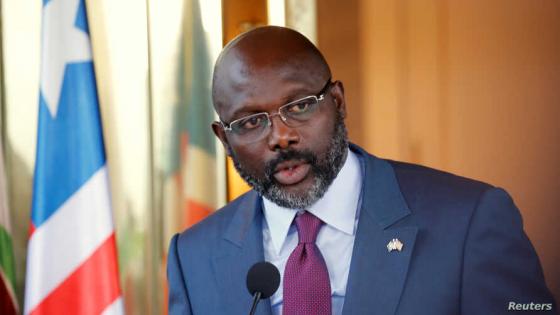President Weah Orders Tighter Security at Guinea Border

President George Manneh Weah
President George Weah has mandated the national security apparatus to increase vigilance and visibility along the border with Guinea as the situation following the military coup remains fluid.
In a statement yesterday, the Executive Mansion noted that President Weah, after chairing an emergency session of the National Security Council, ordered that usual patrols be strengthened by the relevant security forces, who already have a presence along with the border areas, to protect Liberia's territorial integrity and put the country in potential readiness to address any possible border influx of Guinean Citizens who might want to seek refuge in the country.
The emergency session of the National Security Council was called Monday to examine the security and political ramifications that the military and political crises in neighboring Guinea could have on Liberia.
Guinea
The military coup d’étàt in Guinea, which took place on Sunday, September 5, was carried out by an elite national army unit in the Guinea military, deposing the country’s president, Alpha Condé.
“We are taking our destiny into our own hands,” said Col. Mamadi Doumbouya, the head of the unit and leader of the coup. “The personalization of political life is over. We will no longer entrust politics to one man, we will entrust it to the people.”
Security Implication
However, the coup appears to be worrisome for President Weah and other leaders in the ECOWAS sub-region. Any breakdown in the rule of law in Guinea right now could lead to uncontrolled migrations and subsequent humanitarian crises of insecurity in countries neighboring Guinea, including Liberia.
And with the Guinean constitution having been declared suspended by the military, there exists an 18-month window of opportunity for instigators to test the resolve of the military to hold the country together. But more concerning for President Weah and his fellow West African counterparts is that the coup d’étàt threatens an earlier commitment by West African states to the 2001 ECOWAS protocols on democracy and good governance which basically frowns on coup d’étàts.
The disregard for the provisions of the protocol by the military in West Africa, as witnessed in Mali five months ago -- and now Guinea -- does not only undermine the democratic gains made over the last two decades but also increases the likelihood of being truncated. But also set a dangerous precedent that could encourage and embolden other would-be coup plotters in other member countries to take a similar path.
Pres. Weah Concerns
Liberian Leader has since expressed concern over the military takeover in Conakry and called for the strict adherence to ECOWAS Protocols on Democracy and Good Governance which abhors such unconstitutional ascendency to state power in the ECOWAS Sub-region.
The President has joined his West Africa counterparts, including the current ECOWAS chairman, Ghana’s President Nana Akuffo-Addo, to condemn what the regional body called “an attempted coup,” and demanded immediate and unconditional liberation of Condé, who was detained by the soldiers.
However, ECOWAS has failed to inform the public of what concrete steps the regional body had begun to take or was prepared to take to ensure a return of constitutional rule in Guinea, beyond issuing statements of condemnation. According to the Executive Mansion, President Weah remains engaged with his fellow West African Leaders under the framework of the Authority of Heads of State and Governments of ECOWAS in intervening to end the security and political impasse in neighboring Guinea.
Meanwhile, an extraordinary Summit of the Authority of Heads of State and Governments of ECOWAS is scheduled to be held Thursday, September 9, 2021, in Accra, Ghana. President Dr. George M. Weah expected to be in attendance. The Summit aims to review the security and political crises in Guinea and adopt a common approach and strategy in the regional body's intervention.
